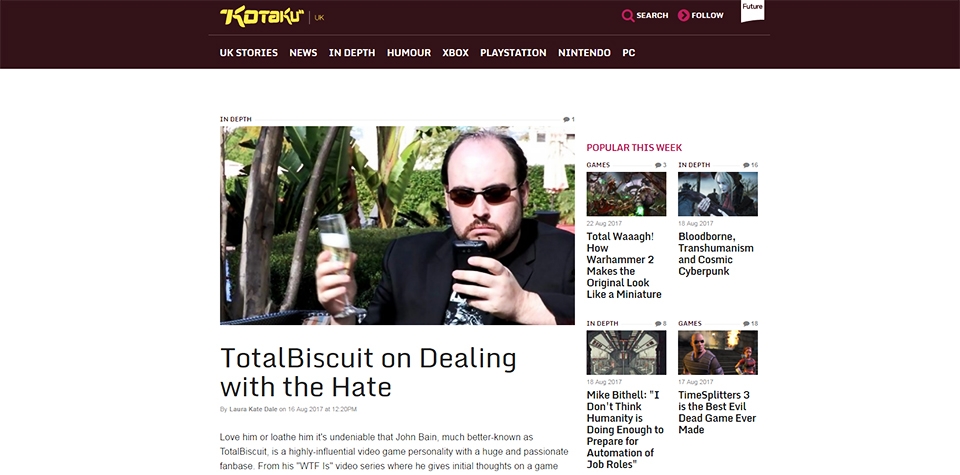

The Kotaku UK article that initiated the backlash. This article is part of a longer series exploring harassment in the gaming community.
By Zach Landau | A&E Editor
On Aug. 16, gaming site Kotaku UK published writer Laura Kate Dale’s latest article in a series devoted to exploring online harassment. The subject of this article was John Bain, better known by his online pseudonym TotalBiscuit. Bain has been one of the more prominent critics within gaming, speaking out in particular against what he believes are unethical business practices and the quality of PC versions of games.
Bain has also been critical of more traditional games journalism, a stance that led him to participate in and support the GamerGate controversy back in Aug. 2014. Initially conducted in response to a (false) allegation of sexual favors being exchanged for positive press, GamerGate swiftly evolved into a harassment campaign particularly obsessed with outing female critics, writers and pundits.
While proponents of the movement, such as Bain, argued that the real mission of the campaign was to reform ethics standards within games press, the immediate and lasting impression of GamerGate was that it was a continuation of the sexist attitudes that have always prevailed in the industry. The rise of social media and forums within the past decade providing the perfect means for harassment, doxing and threats to be organized and executed.
Because of his support of this campaign, Bain has been the target of his own wave of harassment for his support of the movement, and this harassment was what made the context for the Kotaku UK piece.
The problem, however, is that none of this context was provided in the piece. Dale was aware of the cause of the harassment (being a victim of GamerGate herself), but unintentionally neglected to include that information in the piece. To further add insult to injury, the article was published on the anniversary of the movement, a fact pointed out by Feminist Frequency, a website whose founder, Anita Sarkeesian, was also a target of GamerGate.
Now, in any other journalistic profession, Dale and her editor, Rich Stanton, may have had some terse comments from other professionals. A statement would be made, and everyone would move on. However, since this is the video game industry, and everything has to be cut-throat all the time, Dale was instead harassed to the point of near-suicide following the article’s release, driven to temporarily shut down her social media and go offline.
All because of one simple mistake.
Look, I’m not here to tell people how to live their lives, but if your response to a journalist making a mistake is to dog-pile the poor b*stard, to attack someone for not doing the right thing when they do the right thing 99 percent of the time, then…
Well, I don’t know what to say. I really don’t. It’s sh*t, really. That’s the best I can come up with. Every time something like this happens, when journalists have their lives threatened over toys or developers dare to include people of color as their protagonists, I am shocked that this is a hobby that I continue to associate myself with. The hate and vitriol reserved for an industry that only a decade ago was considered lame and nerdy is almost unprecedented.
Maybe I’m wrong about all this, but it feels like gamers, as little as that term means, are some of the meanest, cruelest types of people to exist. And I hate saying that because up until a few years ago, I would have called myself one. I have friends who proudly associate with the label — and for good reasons, too. Still, there are also those who use their hobby as a cudgel, and every time I look at the news, I brace myself for another article about a resignation or another harassment campaign.
And I don’t have a solution for this. I won’t pretend as if there is one solution, or that I of all people would have it. But I would like to return to a time when video games were not synonymous for absolute misery and disgust.
The sad thing is that Dale’s article represented one of the stepping stones to a less-toxic gaming community. It was the latest entry in a series that explored harassment, exposed these monsters for the sadistic cretins that they are and offered some possible solutions for curtailing them. It is a great series, and it could have initiated a huge push for the moderators at Twitch and YouTube to start implementing better community-management tools.
And Feminist Frequency represented the adequate criticism that is needed in journalism. It wasn’t some hateful diatribe against Dale; it was a simple condemnation that Dale and Stanton more or less agreed with. A statement was made, and by all accounts, the writers will be more careful with how their writing can unintentionally be endorsement.
In a vacuum, this could have been a fantastic example of how criticism is meant to help people grow. In an industry desperately in need of professionalism, this incident should have been a representation of how professionals handle contentious situations. Instead, it turned into another mud-flinging episode, another in a long string of unfortunate incidents that seem to only get nastier and nastier. And what a shame that is.





If you are explaining you are losing. The corner of the internet that feel the need to explain gamergate is still losing.